The Yorkshire Terrier is a tiny pup that is full of life! Do not let their small size fool you into thinking that they are a timid, laid back, non-confrontational kind of dog, when in fact this could not be farther from the truth! Here we will chat about Yorkshire Terrier characteristics, and the general temperament of this spunky little breed.
A Yorkie’s personality, Or should I say ATTITUDE. 😉
Ah, Yorkies… the tiny adorable dog that is full of attitude and personality. They are strong willed, and independent, thrill seekers, and rodent chasers. They enjoy being the boss, and are not afraid to show it. If you have several large dogs in your home, and only one small Yorkie, I can almost guarantee that your Yorkie will be the one in charge of all the other dogs.
Their bold and confident nature can even lead to some stubbornness and “selective” listening. Oh, they hear you, they just don’t WANT to listen right now. They seem to have their own agenda at times, and act as if nobody can stop them from accomplishing their tasks.
Don’t get me wrong, Yorkies are incredibly intelligent and can be trained to do many things, even how to listen EVERY time you give a command. However, training them proves to be more difficult than some other breeds because of their loud personality.
Despite having a bit more attitude than your typical dog, Yorkshire Terriers are an incredibly loving and loyal breed. 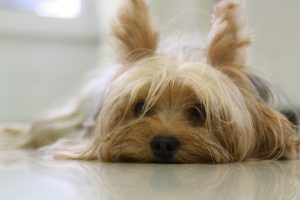 They will have plenty of laid back and relaxed moments as well, and are definitely not wired and energetic 24/7. Most will lay on your lap for hours if you’ll let them, and they will follow you all around your home. They make wonderful companion dogs and will love going with you wherever you are willing to take them.
They will have plenty of laid back and relaxed moments as well, and are definitely not wired and energetic 24/7. Most will lay on your lap for hours if you’ll let them, and they will follow you all around your home. They make wonderful companion dogs and will love going with you wherever you are willing to take them.
Yorkie’s love to protect you.
Yorkies may be tiny, but they can actually make incredible guard dogs. Unless trained not to, Yorkies will bark tirelessly at any noise they hear outside of their home that they think may be a threat to their family. A dog barking is a very good way to deter a burglar from breaking into your house. If someone tries to break in while your home, a Yorkie will alert you to an intruder that you may not have otherwise heard.
These dogs are fiercely loyal and will not hesitate to protect their owner or themselves if 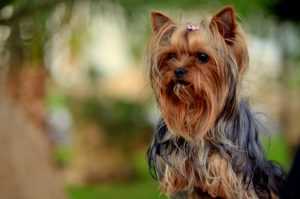 they feel threatened. For this reason it is very important to socialize a new puppy well. Let him experience all different kinds of people, and situations, so that he will not feel threatened when he does not need to be.
they feel threatened. For this reason it is very important to socialize a new puppy well. Let him experience all different kinds of people, and situations, so that he will not feel threatened when he does not need to be.
Yorkies have a lot of energy.
Yorkies are fairly energetic and need sufficient exercise. Although Yorkies can get most of their exercise by playing games with you in the house, and romping around a fenced in yard chasing squirrels, it is still important for them to go on walks. Dogs have a primal instinct to walk, and if this is not being fulfilled, it can lead to behavioral issues, and boredom. They have a deep desire to explore and go on adventures, so make sure you allow your Yorkie to do these things.
Walking is also a great opportunity to show your dog that you are the leader of the pack. Dogs need to know that you are the leader. If we don’t establish this with a dog, they will feel the need to be the pack leader themselves which can lead to unwanted 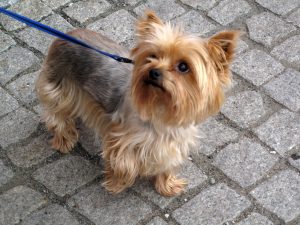 behaviors such as, but not limited to: aggression, separation anxiety, marking in the house, pulling while walking, barking excessively, and more. Going for walks every day and teaching your Yorkie to heel or walk behind you during those walks is an excellent way to show that you are the leader. Practicing this will benefit your Yorkie’s health physically, mentally, and emotionally.
behaviors such as, but not limited to: aggression, separation anxiety, marking in the house, pulling while walking, barking excessively, and more. Going for walks every day and teaching your Yorkie to heel or walk behind you during those walks is an excellent way to show that you are the leader. Practicing this will benefit your Yorkie’s health physically, mentally, and emotionally.
– It will also benefit YOUR health too, which is an added bonus! 😉
Height and Weight
Yorkies are typically around 6 – 9 inches (15.24 to 22.86 cm) tall, measured from the floor to their shoulder, and are anywhere from 4 – 7 pounds (3.2 kg) fully grown.
A Yorkshire Terrier that falls under the 4lb range is usually labeled a “teacup” Yorkie by a breeder. The AKC used to have in the standards that the breed must fall between 4 and 7 pounds, but now it is only required that the dog does not exceed 7 pounds. However, any Yorkshire Terrier that is under 3 lbs is really too small, and most likely will suffer from negative health conditions.
There are some purebred Yorkies that are a bit heavier than the standard 7 pounds and as long as your dog has been looked over by a vet, and is not overweight, this is usually not a call for concern. It just means that the dog will be considered pet quality, not show quality.
Breed Description.
By breed standards, Yorkshire Terriers should have a steel blue and tan coat, which is 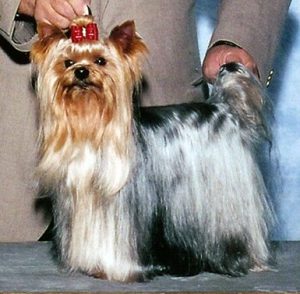 parted down the middle on the face, and from the top of the head to the base of the tail. The hair should fall straight and evenly down both sides, and be glossy, and silky to the touch. However, there are actually more color and coat varieties of Yorkies. They are not considered breed standard, but they are still beautiful pet quality companions.
parted down the middle on the face, and from the top of the head to the base of the tail. The hair should fall straight and evenly down both sides, and be glossy, and silky to the touch. However, there are actually more color and coat varieties of Yorkies. They are not considered breed standard, but they are still beautiful pet quality companions.
You can find Yorkshire Terriers typically in these four color schemes: Black & Gold, Black & Tan, Blue & Gold, and Blue & Tan. There are also Parti Yorkies, which are mostly white on their body with black markings on the back, and black and/or tan markings on their face. Some Yorkies have the silky, straight coat, and others have more of a wavy, almost curly coat.
Yorkie’s tails should be docked at a medium length, however not all breeders believe in doing this, and in some places of the world it is actually illegal to do so. For that reason, Yorkies can also be found with long tails that are held erect and curled a bit towards their body.
Their backs should be rather short and level, with the height at the shoulders being the same as the height at the rump. The body should be compact and proportional, legs straight when looking from the front, and feet round with black claws. The dewclaws are usually removed from the hind legs, and may or may not be removed from the forelegs.
Their heads should be small, with a rather flat top. Muzzles are medium in length, the nose is black, and eyes should be dark in color, medium in size, and not too prominent. They should sparkle and be full of life, showing off their curiosity, eagerness to learn, and clever personality. Yorkie’s ears should be small, V-shaped, and standing up. There are a lot of pet quality Yorkies with floppy, or half erect ears. Mine being one of them! Although a Yorkshire Terrier cannot be shown with this “flaw” it is still incredibly cute, and I see it as one of my Yorkie’s most adorable qualities!
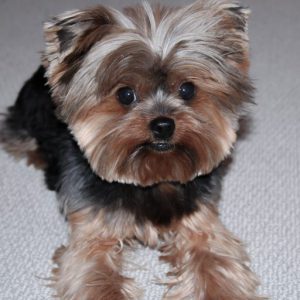
Yorkies can come in different shapes, sizes, and colors. Some of them have longer snouts, some may be bigger than the standard, and some of them end up with large bat-like ears that make you think they must be able to navigate by sonar. 😉 The point being, if you are looking to show your Yorkie, then all the breed standards must be met, but there are plenty of healthy, purebred Yorkies that are just as wonderful of companions that might just fall a little short of the standard AKC breed description.
Be careful of Yorkies that fall too far from the breed standard.
When looking for a breeder to purchase a puppy from, do make sure that you do your homework and pick a reputable breeder who is striving to reproduce dogs that are within the breed standard, with not too many flaws. A breeder should be working with a championship bloodline, producing puppies that are healthy, and only breeding dogs that are an exceptional representation of the breed. Even so, breeders do end up with pups that are more pet quality than show quality. Not all Yorkies can be champions, and even the ones with few “flaws” make incredible pets!
If a breeder consistently produces litters that are very far off from the breed standard, then they may not actually be purebred, and they will likely have many health issues due to being bred poorly. Unfortunately, puppy mills and irresponsible breeders do still exist, so beware of advertisements for “cheap Yorkie puppies.” You may be paying less for your puppy up front, but most likely you’ll be shoveling out loads of money towards vet bills later for a “cheap puppy” that was poorly bred or kept in unsanitary conditions.
Choose wisely, and you will have an amazing companion for up to 16 years with, hopefully, not many trips to the vet!
Is the Yorkshire Terrier the right breed for you?
Before you make a commitment to a Yorkie pup, make sure you have an ample amount of time to spend with your new best friend. Remember, Yorkies can be a bit harder to train initially. Their attention span as puppies is short, as they are eager to explore, and play in their environment! That being said, they are very capable of learning a vast amount of tricks and skills, as long as you have the time, and patience to put into their training.
Yorkies are small, and are usually good travelers. They shed very little, if at all, and don’t require as much walking as most breeds. They are great apartment dogs, and wonderful lap dogs. Yorkies tend to do best in families with older children or no children at all. They either do not have the patience for young children like other breeds do, or, because of their small size, they tend to develop fear of being hurt by young children and can become snappy towards them.
Be sure that you are a person who can handle a little attitude. Yorkies are awesome little dogs, and they know it! They will strut their stuff, and sometimes act too cool for school. All Yorkies vary in personality and some are more laid back than others, but most will continually try to push the envelope on boundaries that they know have been put into place. They can also hold a grudge if their routine has been disrupted in a way that displeases them.
Personally, I kind of like that such a little dog can carry so much confidence and sass. It makes for a very entertaining dog! They may have you rolling your eyes from time to time, but they will also have you in stitches laughing at their silly antics. However, if your personality would be better suited with a very calm, relaxed, easy going, eager to please kind of breed, then you may need to think twice before taking on a Yorkshire Terrier. They may look pretty and dainty on the outside, but they are straight up Tomboy at heart. 🙂
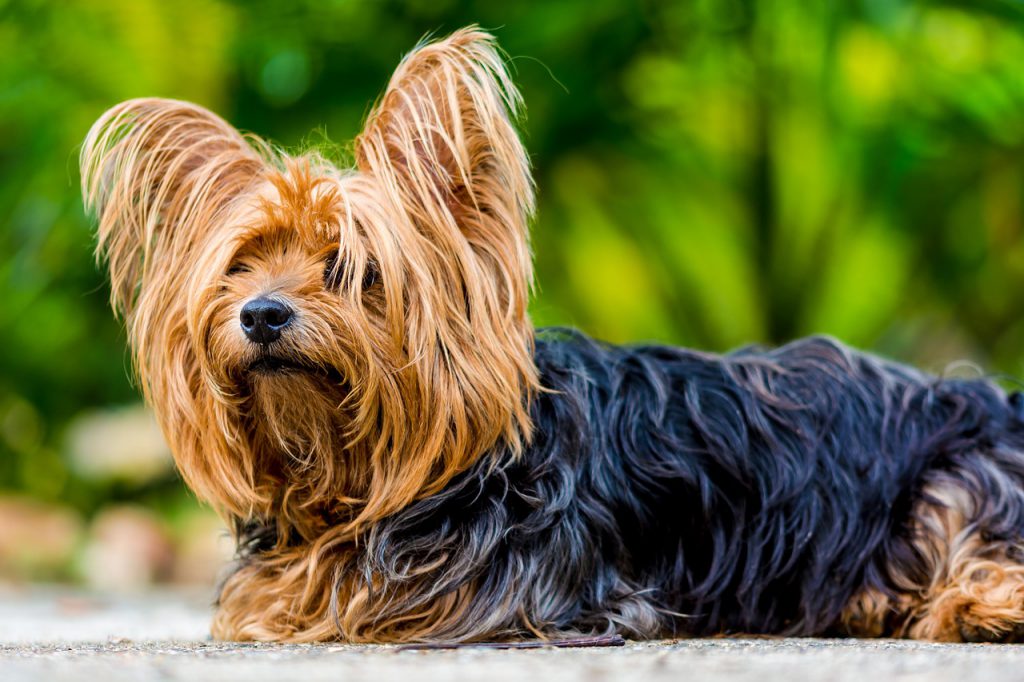
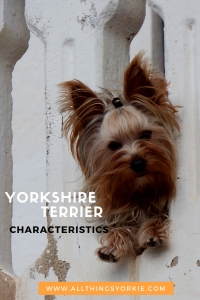
– Save this information for later, and help us spread the word by pinning this post to Pinterest!
Hover over or tap the photo to see the Pin it option.
To Learn more about the History of the Yorkshire Terriers click Here!
Looking for a really nutritious dog food to feed to your Yorkie, check out my top recommendations Here.

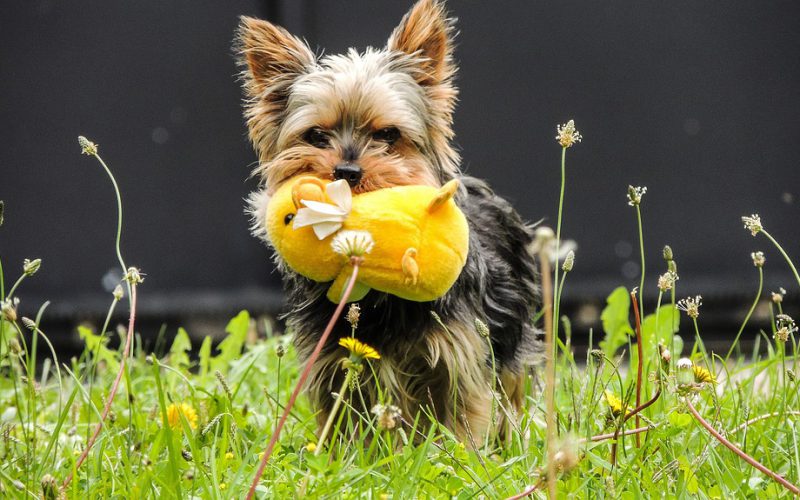
This is so cool. I learn something new everyday. Im not great with knowing dog breeds but this shines a new light. Yorkies look like ground best friends to be may even consider getting one.
Yorkies are such wonderful companions!! They will be sure to keep you on your toes, but I like that in a dog. 🙂
I don’t have any experience with a purebred Yorkie, but my sister has an adorable 3-year-old Yorkie Poo (“Luci”) that most definitely seems to have the Yorkie personality traits. Your description was very thorough and helpful for understanding this feisty dog a little better!
My sister would like for Luci to be trained to heel so that taking her on walks wouldn’t be so unpleasant. She is worried that teaching Luci (she’s about 8 pounds) using a standard choke collar and leash (for her size) would be too hard on Luci’s neck. What type collar and leash would you recommend for this training? (I have experience teaching larger (70+ pound) dogs to heel, but have never tried training such a small dog.)
Aw! Yorkie Poos are seriously adorable too! Funny how that Yorkie personality just takes right over even in a mixed breed! haha.. Your sister is correct in thinking that a choke collar and leash would be too hard on Luci’s neck. A choke collar puts a lot of pressure onto a dogs trachea and if the cartilage rings around the trachea become misshapen it can cause it to collapse. Yorkie’s genetics and size cause them to have weaker cartilage rings, the are the most affected breed and are seen the most for trachea collapse. This condition makes it very hard for the dog to breath, and can even require surgery in the worst cases. The best collar for a smaller breed (especially a Yorkie) is a thick and supportive harness. I use the EcoBark small dog harness for my Willow! It doesn’t put any pressure on the trachea, so you don’t have to worry about holding them tight to you, or giving a little tug on the harness while trying to train to heel. In the future I am hoping to do a post on training to heel. 🙂 I included a link to view the harnesses I am talking about if you are interested! Thank you for the comment!
Thanks for this great advice! Now we can actually give this training a go.
Absolutely! I hope it goes well for little Luci. 🙂
My Grandmother had Yorkie terriers, and thats all she had. They were the most fun to play with when I was boy. All of her Yorkies were very sweet and yes very protective dogs at the same time. The yorkie terrier is truly a great companion. Now you got me thinking of getting one for myself. Nice post, Good Read..
They truly are the best mix of super sweet, but still rough and tumble! All they want is to spend as much time as possible with their person.:)
I absolutely love Yorkshire Terrier. My aunt had one and every time I would visit her this little dog would come and play nonstop! He was a big fan of fetch and I could never stop him from bringing the ball back, lol. I definitely agree that they are full of thrill and personality. You have hit the nail right on the head with this article so great job! Thanks for all the info.
Thank you so much! They are such a fun breed. I’m not sure if I’ll ever have a home without a Yorkie in it! They just know exactly how to make you smile. 🙂 Thank you for the comment!